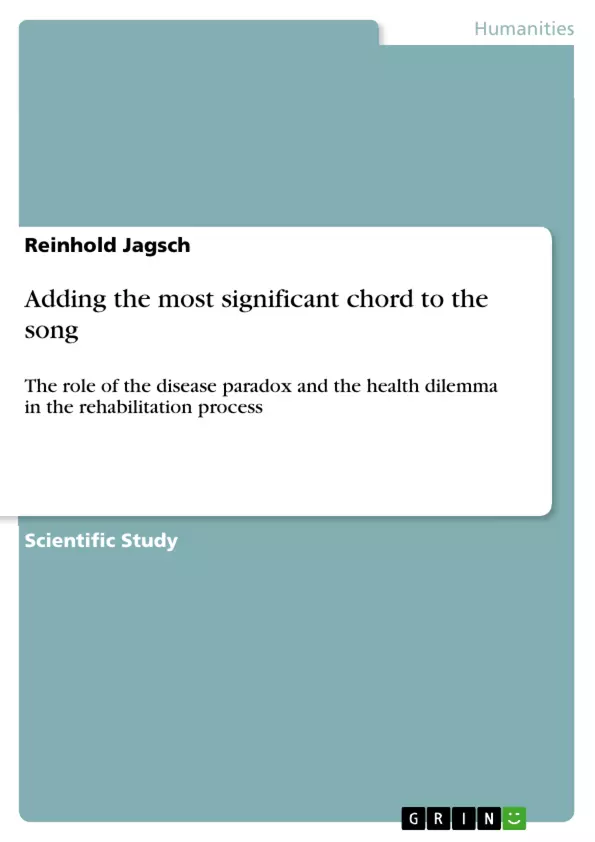Summary. Background: This article provides an overview of studies in which assessments of specific functional capacity, made by experts on the one hand (objective) and by patients on the other (subjective) were compared in various patient groups. In essence, these data reveal marginal or insignificant associations.
Methods: Based on these considerations, a theoretical differential-diagnosis model of objective findings/subjective state of health is presented. By dichotomization of specific functional capacity at these two levels, the model permits the classification of a patient cohort into four sub-groups: Patients with concurrence between subjective and objective assessments are referred to as “the fortunate” while those with a negative concurrence are termed “the unfortunate”. In case of discrepancies between these two levels, for instance when patients’ subjective assessment was good although their condition was obviously poor, they are considered to be in a so-called “disease paradox”. Alternatively, patients whose subjective assessment of their condition was poor although the objective findings were positive, were considered to be in a so-called “health dilemma”.
Results: The study in a sample of patients who had received an artificial hip joint for mobility disorders revealed striking differences in health-related quality of life (HrQol). Comparisons of HrQoL data pre- and post-operatively in the whole sample demonstrated an improvement in five of six dimensions (loss of energy, pain, emotional reaction, sleeping problems, and problems in physical mobility, p<0.01) of the Nottingham Health Profile. Specifically, after grouping patients accordingly to the proposed model striking positive changes in HrQoL were registered in patients of the fortunate and disease paradox groups while the improvements in the health dilemma and unfortunate groups were minimal.
Conclusion: Timely identification of these patients in the process of rehabilitation would significantly contribute to the achievement of a good health-related quality of life for all patients.
Inhaltsverzeichnis (Table of Contents)
- Summary
- Introduction
- Discrepancies between objective findings and subjective state of health in the health sector
- The disease paradox and the health dilemma in the rehabilitation process
- Discussion
- Conclusion
Zielsetzung und Themenschwerpunkte (Objectives and Key Themes)
The article aims to investigate the discrepancies between objective assessments of functional capacity made by experts and subjective evaluations of health by patients, particularly in the context of rehabilitation. This research explores the impact of these discrepancies on patients' health-related quality of life (HrQol) and proposes a theoretical model for understanding these differences.
- The relationship between objective and subjective health assessments
- The "disease paradox" and the "health dilemma" as contrasting scenarios
- The impact of these discrepancies on HrQoL
- The significance of timely identification of these patient categories for effective rehabilitation
- The application of these concepts in the context of total hip arthroplasty
Zusammenfassung der Kapitel (Chapter Summaries)
- Summary: This chapter introduces the research question and provides an overview of studies comparing objective and subjective assessments of functional capacity. It highlights the limited associations found and introduces a theoretical model for classifying patients based on the concurrence or discrepancy between these assessments.
- Introduction: This chapter reviews existing theories and models related to discrepancies between medical expert evaluations and patient perceptions of health. It discusses the concepts of "inappropriate illness behavior" and "abnormal illness behavior" and presents the original model of Filipp and Ferring (1991) for understanding subjective and objective evaluations of quality of life.
- Discrepancies between objective findings and subjective state of health in the health sector: This chapter explores the limited associations between doctors' estimations of health-related stresses and patients' evaluations of their health, drawing on empirical studies and research findings. It emphasizes the need to acknowledge these discrepancies in healthcare practice.
- The disease paradox and the health dilemma in the rehabilitation process: This chapter presents the results of a study examining HrQoL in patients who received a total hip replacement. It explores the influence of the "disease paradox" and the "health dilemma" on HrQoL and highlights the importance of early identification of these categories for successful rehabilitation.
- Discussion: This chapter delves into the implications of the findings for clinical practice and research. It explores the practical applications of the proposed theoretical model, discusses its limitations, and suggests future research directions.
Schlüsselwörter (Keywords)
The key words and concepts within the text revolve around the complex relationship between objective and subjective assessments of health, particularly in the context of rehabilitation. This includes concepts like health-related quality of life (HrQoL), the Nottingham Health Profile, functional capacity, total hip arthroplasty, "disease paradox", and "health dilemma". The research aims to understand the discrepancies between these assessments and their impact on patient outcomes, ultimately seeking to improve rehabilitation practices and patient well-being.
Frequently Asked Questions
What is the main focus of the study regarding functional capacity?
The study focuses on comparing objective assessments of functional capacity made by experts with the subjective evaluations of health made by the patients themselves.
What is defined as the "disease paradox"?
The "disease paradox" refers to a discrepancy where a patient's subjective assessment of their health is good, even though their objective medical condition is poor.
What is the "health dilemma" in this model?
The "health dilemma" occurs when a patient's subjective assessment of their condition is poor despite positive objective medical findings.
How did hip joint surgery affect patients' quality of life in the study?
The study showed significant improvements in five of six dimensions of the Nottingham Health Profile, including pain, energy levels, and physical mobility, following the surgery.
Which patient groups showed the least improvement in HrQoL?
Patients categorized in the "health dilemma" and "unfortunate" groups showed only minimal improvements in health-related quality of life compared to the "fortunate" and "paradox" groups.
Why is timely identification of these patient categories important?
Identifying these discrepancies early in the rehabilitation process allows for better-targeted support, contributing to a higher health-related quality of life for all patients.
- Quote paper
- Dr. Reinhold Jagsch (Author), 2010, Adding the most significant chord to the song, Munich, GRIN Verlag, https://www.grin.com/document/165012



